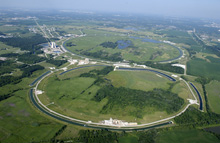 | Monday, November 7, 2005 |
|
Monday, November 7
Tuesday, November 8 |
|
|
Secon Level 3 |
|
Monday, November 7 - French Quarter Gumbo - French Dip w/Horseradish Cream Sauce - Smart Cuisine Santa Fe Pork Stew - BBQ Roasted Quartered Chicken - Turkey Breast on Homemade Fococcia - Pizza - Sweet n' Sour Chicken w/an Egg Roll The Wilson Hall Cafe accepts Visa, Master Card, Discover and American Express at Cash Register #1. |
|
Wednesday, November 9
Chez Leon Menu |
| Fermilab Today is online at: http://www.fnal.gov/today/ Send comments and suggestions to today@fnal.gov Fermilab Today archive Hurricane Relief Page Fermilab Today PDF Version Fermilab Result of the Week archive Fermilab Safety Tip of the Week archive Linear Collider News archive Fermilab Today classifieds Subscribe/Unsubscribe to |
|
From FYI: The American Institute of Physics Bulletin of Science Policy News
Report Highlights "Worrisome Indicators" of US Competitiveness A committee of the National Academies has issued a report that recommends a series of actions for the federal government to take to maintain the nation's competitiveness through the 21st century. The report, "Rising Above the Gathering Storm: Energizing and Employing America for a Brighter Economic Future," runs approximately 150 pages plus a lengthy series of appendices. It can be ordered, or read online. In the Executive Summary, the committee highlighted a series of "Worrisome Indicators" that the U.S.'s global preeminence is declining. This list is quoted below.
"When asked in spring 2005 what is the most attractive place in the world in which to ‘lead a good life,' respondents in only one of the 16 countries polled (India) indicated the United States."
|
| Avian Flu | ||
Though the H5N1 virus is rapidly spreading among birds, human infections continue to be rare. As of November 1, the World Health Organization reported there had been 122 confirmed cases and 62 deaths. All occurred in Southeast Asia following close contact with infected poultry. The primary concern is that the virus will mutate to allow human-to-human transmission. A vaccine is under development and two antiviral medicines, oseltamavir (Tamiflu®) and zanamavir (Relenza®), appear to be effective. There are a number of things you can do until infection control programs are put in place by various units of government. Practice good health habits: Eat a balanced diet, get daily exercise and sufficient rest, and take common-sense infection control measures (wash hands often, cover coughs/sneezes, and avoid others if sick). Stay informed about the avian flu: Monitor the news and consult this government website for additional information. Prepare for foreign travel: Make sure your vaccinations are current, take basic first aid supplies and identify in-country health-care resources. Avoid contact with poultry and poultry secretions. [Note: Well-cooked food is safe.] Monitor your health for 10 days after return. If you develop flu-like symptoms, contact your health care provider and avoid travel except to seek care. Specific concerns? Consult with your personal health care provider. |
|
November 2 - 4 - Two stores provided 27 hours and 48 minutes of luminosity. - Store 4481 aborted due to RF trip. Read the Current Accelerator Update |
|
Mileage Reimbursement Rate Increase In recognition of recent gasoline price increases, the Internal Revenue Service and the General Services Administration have increased the standard mileage rate reimbursement to 48.5 cents per mile for business miles driven between September 1 and December 31, 2005.
Bench Dedication
|

